📜 The Great War Begins – Why America Entered World War I
📌 Explore the origins of World War I, including the Zimmermann Telegram, the Lusitania sinking, Germany’s unrestricted submarine warfare, and President Wilson’s war declaration. This historical collection is an essential resource for teachers, students, genealogists, and historians.
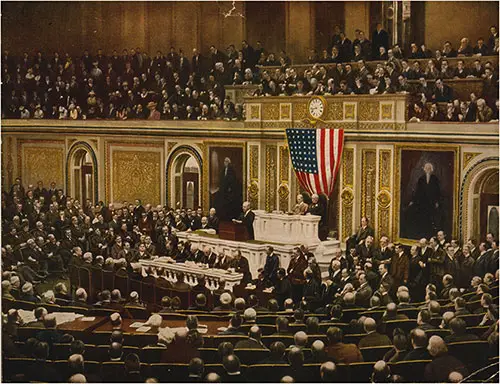
President Wilson Asking Congress to Declare War on German, 2 April 1917. Library of Congress # 2002716887. | GGA Image ID # 180fff37da
🌍 The Great War Begins – A Pivotal Chapter in History
🔍 Understanding the Dawn of World War I
This section of the GG Archives' World War I Collection provides an in-depth look at the origins and escalation of the Great War, focusing on key events that led the United States to enter the conflict. The collection examines the Zimmermann Telegram, Germany’s unrestricted submarine warfare, the assassination of Archduke Franz Ferdinand, and Britain’s entry into the war, culminating in President Woodrow Wilson’s historic war declaration on April 6, 1917.
Great Britain and France had been fighting since the beginning of the war in 1914, while Italy joined in May 1915 and the United States in April 1917. On the other hand, all the European Powers had reached, if not passed, their meridian of strength, whereas the United States could, with a corresponding effort, raise her forces to over ten million.
She was the most powerful of the associated nations, and only the British fleet's existence brought any rival up to anything like equality. Together the United States and the British Empire were irresistible.
So long as they agreed, any concessions they might make to others would be due not to fear but to their sense of justice, desire for peace, and consideration for others' susceptibilities.
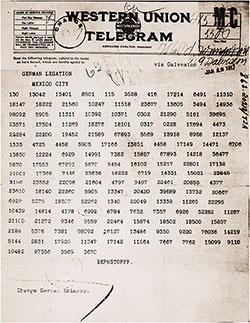
Prelude to War: The Zimmermann Telegram
German Foreign Minister Arthur Zimmermann sent an encoded message to the President of Mexico. The Germans revealed plans to begin unrestricted submarine warfare, and Germany proposed an alliance with Mexico on January 16, 1917.
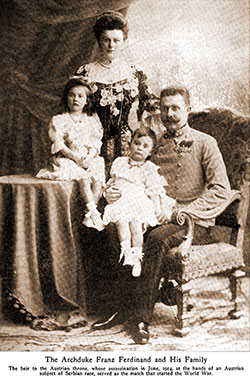
The greatest war in history resulted from Germany's claim to dominate the world and the inevitable resistance, which such a pretension excited.
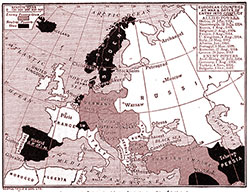
Britain Joins the War - 4 August 1914
The only question still open was what Britain was to do. To prevent the war, Sir Edward Grey proposed to refer all disputes to a European conference. Still, the Central Powers contemptuously rejected his suggestion.
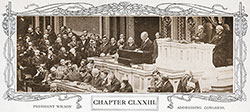
Thus by April 1917, the resumption of unrestricted submarine warfare by Germany had brought the United States, the last of the world's Great Powers, into the war on the side of the Allies.
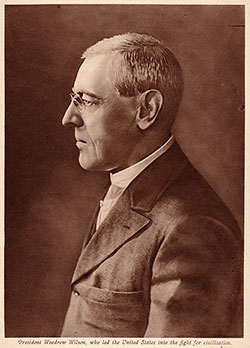
President Wilson's War Address
Property can be paid for; the lives of peaceful and innocent people cannot be. The present German submarine warfare against commerce is warfare against humanity.
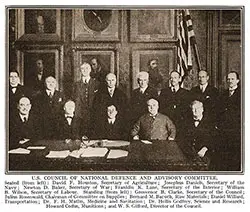
President Wilson's Address as the US Joins The Great War
The unexpected Russian miracle deeply stirred President Wilson. He at once shortened, by two weeks, the date for the convening of Congress and the declaration of war against Germany.
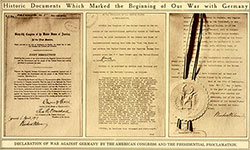
The American President, Woodrow Wilson, wisely allowed matters to move slowly, so that when the Germans had filled up the cup of their offenses, it was at the head of a united nation that, on April 6, 1917, he declared war.
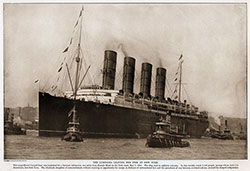
Two years before our entrance into the war, Germany had been carrying on open warfare against us within our borders. Germany's policy of preparatory penetration had been in course for more than thirty years.
🔹 Who is this collection for?
✔ Teachers & Students – Offers primary source materials and historical context to explain why the war erupted and how the U.S. became involved.
✔ Historians & Researchers – Provides detailed political insights and diplomatic maneuvers that shaped the course of the war.
✔ Genealogists & Family Historians – Helps trace ancestors who lived through or participated in these defining moments.
This section effectively illustrates the transformation of the war from a European struggle to a global conflict, marking the emergence of the U.S. as a major world power.
📜 Key Highlights from the Collection
⚔️ Prelude to War: The Zimmermann Telegram (January 16, 1917)
✔ German Foreign Minister Arthur Zimmermann sent an encoded message to Mexico, urging them to join forces with Germany against the United States.
✔ The telegram promised Mexico U.S. territories (Texas, Arizona, and New Mexico) in exchange for military support.
✔ Intercepted and decoded by British intelligence, the telegram was shared with the U.S., outraging the American public and pushing the nation closer to war.
🔹 Why This Matters:
🔹 A turning point in U.S. foreign policy – The revelation of Germany’s plot made war seem inevitable.
🔹 An excellent case study for students on diplomatic espionage, coded messages, and intelligence warfare.
📌 The Spark: Assassination of Archduke Franz Ferdinand (June 28, 1914)
✔ The assassination of the heir to the Austro-Hungarian throne in Sarajevo triggered a chain reaction of alliances and war declarations.
✔ Austria-Hungary blamed Serbia, prompting Germany’s aggressive support and Russia’s mobilization.
✔ By August 1914, most of Europe was engulfed in war.
🔹 Why This Matters:
🔹 Shows how a single political assassination led to a world war – an essential study of geopolitics.
🔹 Highlights the instability of European alliances and how militarism, nationalism, and imperialism played a role in global conflict.
📌 Britain Joins the War (August 4, 1914)
✔ Britain entered the war after Germany violated Belgium’s neutrality by invading the country.
✔ This brought the world’s strongest naval power into direct conflict with Germany.
✔ Sir Edward Grey, the British Foreign Secretary, proposed negotiations, but Germany rejected them outright.
🔹 Why This Matters:
🔹 Explains Britain’s crucial role in rallying the Allies and preventing a swift German victory.
🔹 Illustrates the importance of treaties, neutrality, and international diplomacy.
📌 The United States Intervenes (April 6, 1917)
✔ For three years, the U.S. remained neutral, supplying weapons and resources to the Allies.
✔ Germany’s use of unrestricted submarine warfare (sinking American ships like the Lusitania) forced America’s hand.
✔ By April 1917, Wilson had no choice but to bring the United States into the war.
🔹 Why This Matters:
🔹 Shows how America transitioned from isolationism to global involvement.
🔹 Essential for understanding modern U.S. foreign policy and military interventionism.
📌 President Wilson’s War Address (April 2, 1917)
✔ Delivered to Congress, Wilson framed the war as a fight for democracy and justice.
✔ Famous line: "The world must be made safe for democracy."
✔ Emphasized that Germany’s submarine warfare was not just an attack on commerce but an attack on humanity.
🔹 Why This Matters:
🔹 A defining speech in American history – often studied in political science and history classes.
🔹 Influenced future U.S. foreign policy, including World War II and the Cold War.
📌 America Declares War on Germany (April 6, 1917)
✔ After months of debate, Congress officially declared war.
✔ The U.S. military was small but rapidly mobilized, preparing to send over 2 million soldiers to Europe.
✔ Germany underestimated America’s industrial and military potential, a mistake that would ultimately cost them the war.
🔹 Why This Matters:
🔹 Marks the emergence of the U.S. as a world power.
🔹 Explains the economic and military mobilization that led to America’s success in both World War I and II.
📌 Why We Went to War – The Lusitania & German Espionage
✔ Germany had been secretly conducting espionage and sabotage in the U.S. for over two years.
✔ The sinking of the Lusitania (May 7, 1915) by a German U-boat killed 1,198 passengers, including 128 Americans.
✔ For over 30 years, Germany had been infiltrating American infrastructure to prepare for war.
🔹 Why This Matters:
🔹 A fascinating look at pre-war intelligence, propaganda, and military strategy.
🔹 The Lusitania tragedy became a rallying cry for American intervention.
🔍 Final Thoughts: A Must-Read for Anyone Interested in WWI History
📌 For educators, this collection offers firsthand accounts, political speeches, and intelligence reports to bring history to life.
📌 For historians, it provides rare insights into diplomatic maneuvers and military decisions that shaped the 20th century.
📌 For genealogists, it includes essential records of U.S. involvement, which can help trace family members who fought in the war.
📜 From the secret German plots to the dramatic American entry into the war, this collection captures the key moments that changed history forever. 🇺🇸✨
